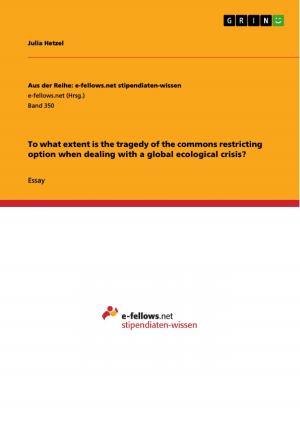Israel's Colonial Predicament
A Novel Framework for Analysing Israeli-Palestinian Relations and Conflict
Nonfiction, Social & Cultural Studies, Political Science, International, International Relations| Author: | Florian Heyden | ISBN: | 9783638033480 |
| Publisher: | GRIN Publishing | Publication: | April 8, 2008 |
| Imprint: | GRIN Publishing | Language: | English |
| Author: | Florian Heyden |
| ISBN: | 9783638033480 |
| Publisher: | GRIN Publishing |
| Publication: | April 8, 2008 |
| Imprint: | GRIN Publishing |
| Language: | English |
Master's Thesis from the year 2006 in the subject Politics - International Politics - Region: Near East, Near Orient, grade: Distinction (Very good), King`s College London (King's College London), course: The Occupied Territories Since 1967, 45 entries in the bibliography, language: English, abstract: The Israeli-Palestinian conflict is a complicated and multi-dimensional conflict. In many contexts, it is very hard, if not impossible, to assess the violence between Palestinian and Israeli society today without resorting to a developed theory rather than emotion. However, many scholars and politicians hold the assumption that Israel and the Israeli-Palestinian conflict cannot be properly understood with the frameworks, categories and concepts employed to understand other countries and conflicts . We shall endeavour to counter such beliefs and develop exactly that, a framework for analysing Israeli-Palestinian relations and conflict, allowing us to put the conflict into perspective and further develop a structural investigation into the root causes of conflict. We will do this at the example of the Algerian uprising against French colonialism. To develop such a framework, we will draw on classic texts such as the writings of Fanon and Memmi, as well as works by writers such as Bregmann, Barnett and Khader, but also on others, cross-referencing continuously between texts on colonialism, Israel-Palestine, and Algeria. As the title of this text indicates, the author holds the view that the relationship between Israel and the Palestinians living in the Occupied Territories is essentially a colonial one. This is not to say that we should consider the Territories a colony. Algeria was not a colony. What we want to say is that we believe in the existence of a colonial relationship between the two populations, based on the principles of colonialism. Why Algeria? We have chosen French colonialism in Algeria for the structural basis of our framework for a number of reasons. First, because France, like Israel, denied the colonial character of Algeria's situation; second, because analysts appear to have regularly felt the urge to draw attention to the parallels between the Battle of Algiers and Israel's reaction to the Palestinian's uprising, while the evacuation of French settlers from Algeria is being cited in Israel as a precedent for the Israeli disengagement from the Occupied Territories; and third, because of the immense impact the Algerian War had on the conceptual world of resistance movements around the world - including the then-young PLO hoping to repeat the FLN's tactics of national liberation in Palestine.
Master's Thesis from the year 2006 in the subject Politics - International Politics - Region: Near East, Near Orient, grade: Distinction (Very good), King`s College London (King's College London), course: The Occupied Territories Since 1967, 45 entries in the bibliography, language: English, abstract: The Israeli-Palestinian conflict is a complicated and multi-dimensional conflict. In many contexts, it is very hard, if not impossible, to assess the violence between Palestinian and Israeli society today without resorting to a developed theory rather than emotion. However, many scholars and politicians hold the assumption that Israel and the Israeli-Palestinian conflict cannot be properly understood with the frameworks, categories and concepts employed to understand other countries and conflicts . We shall endeavour to counter such beliefs and develop exactly that, a framework for analysing Israeli-Palestinian relations and conflict, allowing us to put the conflict into perspective and further develop a structural investigation into the root causes of conflict. We will do this at the example of the Algerian uprising against French colonialism. To develop such a framework, we will draw on classic texts such as the writings of Fanon and Memmi, as well as works by writers such as Bregmann, Barnett and Khader, but also on others, cross-referencing continuously between texts on colonialism, Israel-Palestine, and Algeria. As the title of this text indicates, the author holds the view that the relationship between Israel and the Palestinians living in the Occupied Territories is essentially a colonial one. This is not to say that we should consider the Territories a colony. Algeria was not a colony. What we want to say is that we believe in the existence of a colonial relationship between the two populations, based on the principles of colonialism. Why Algeria? We have chosen French colonialism in Algeria for the structural basis of our framework for a number of reasons. First, because France, like Israel, denied the colonial character of Algeria's situation; second, because analysts appear to have regularly felt the urge to draw attention to the parallels between the Battle of Algiers and Israel's reaction to the Palestinian's uprising, while the evacuation of French settlers from Algeria is being cited in Israel as a precedent for the Israeli disengagement from the Occupied Territories; and third, because of the immense impact the Algerian War had on the conceptual world of resistance movements around the world - including the then-young PLO hoping to repeat the FLN's tactics of national liberation in Palestine.















